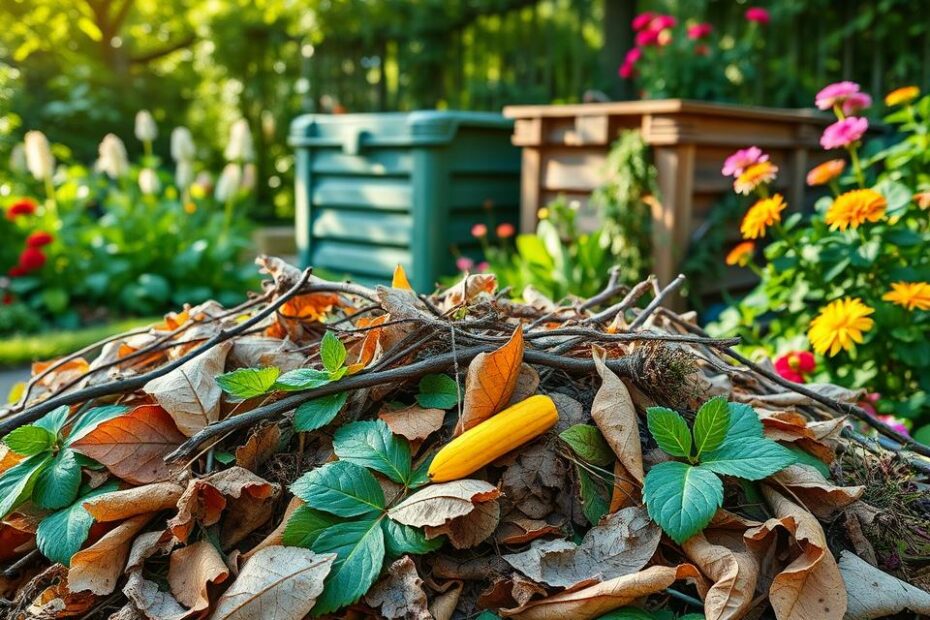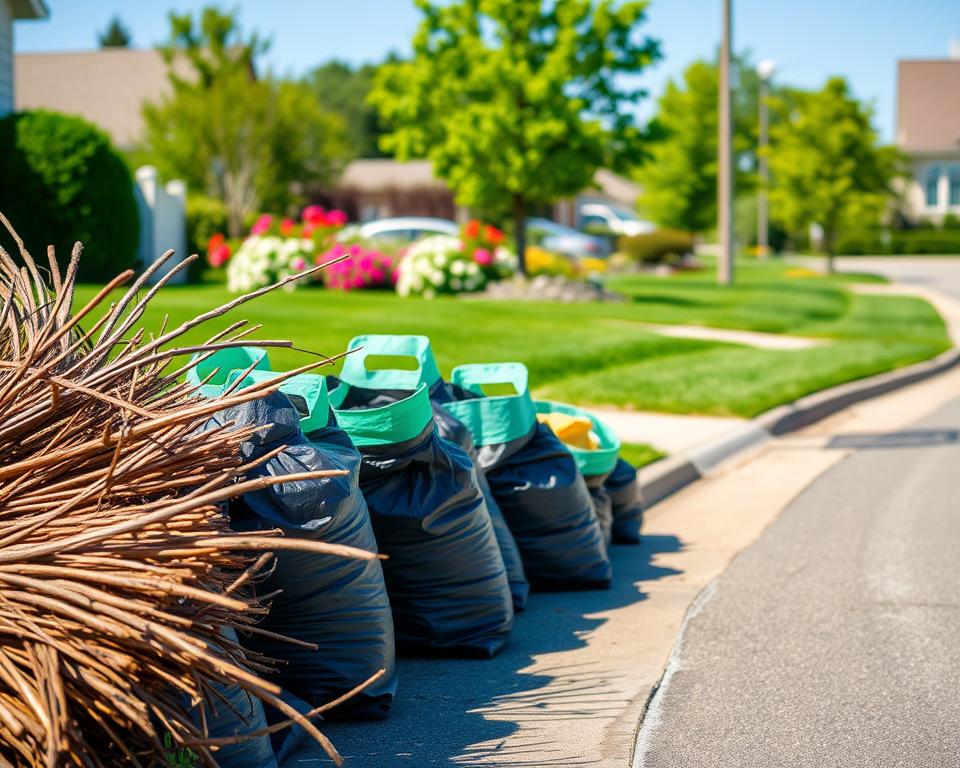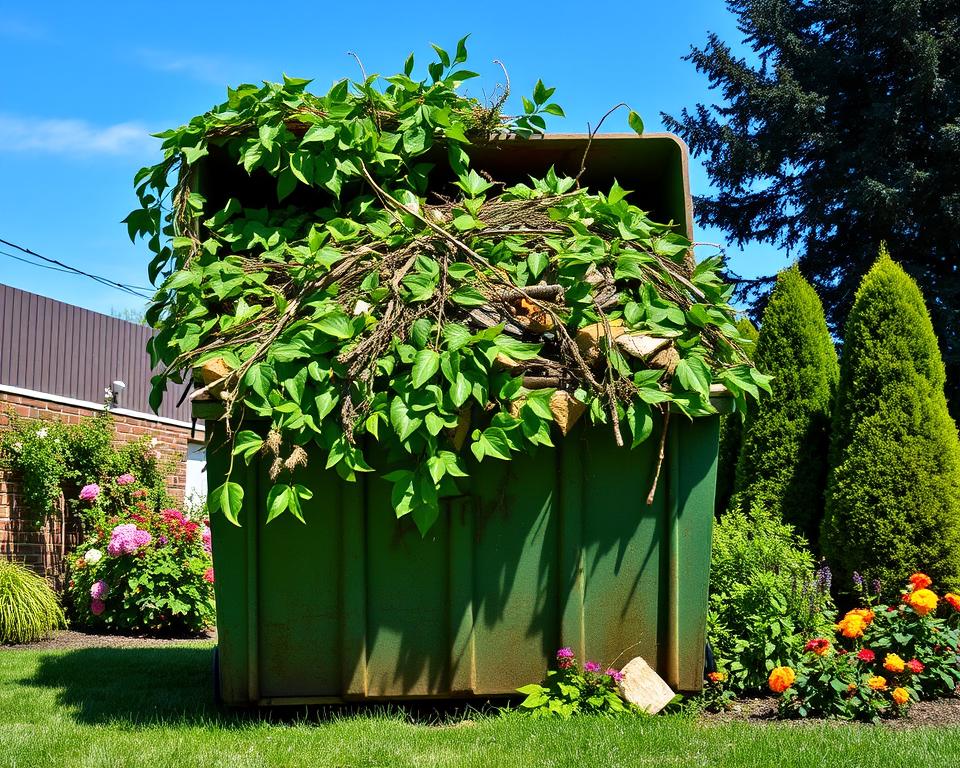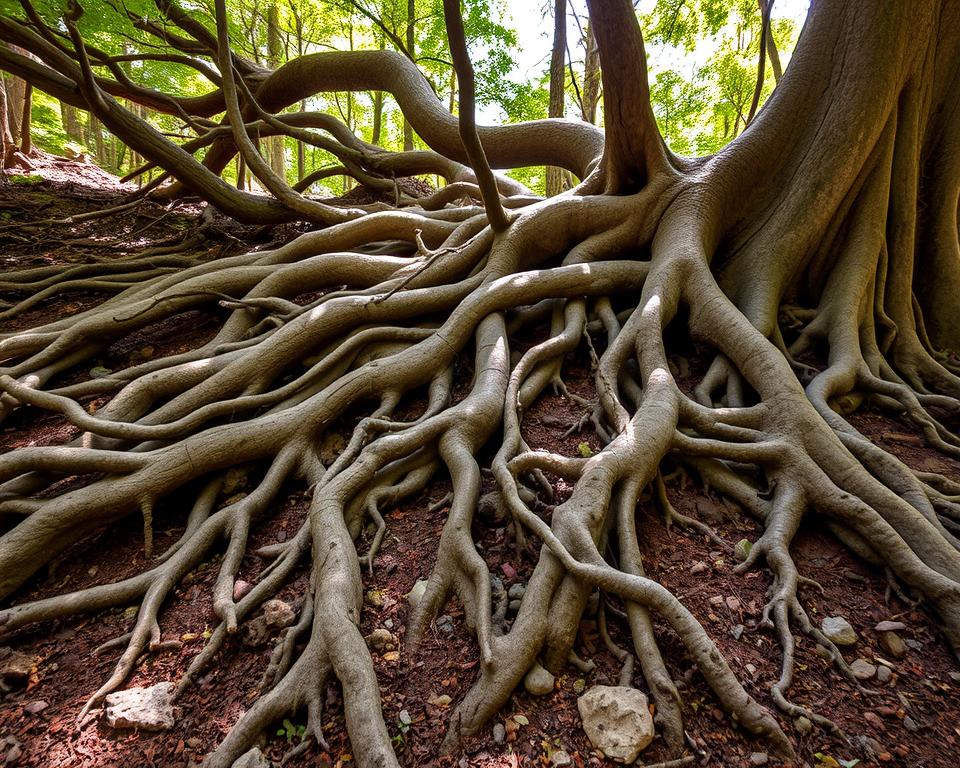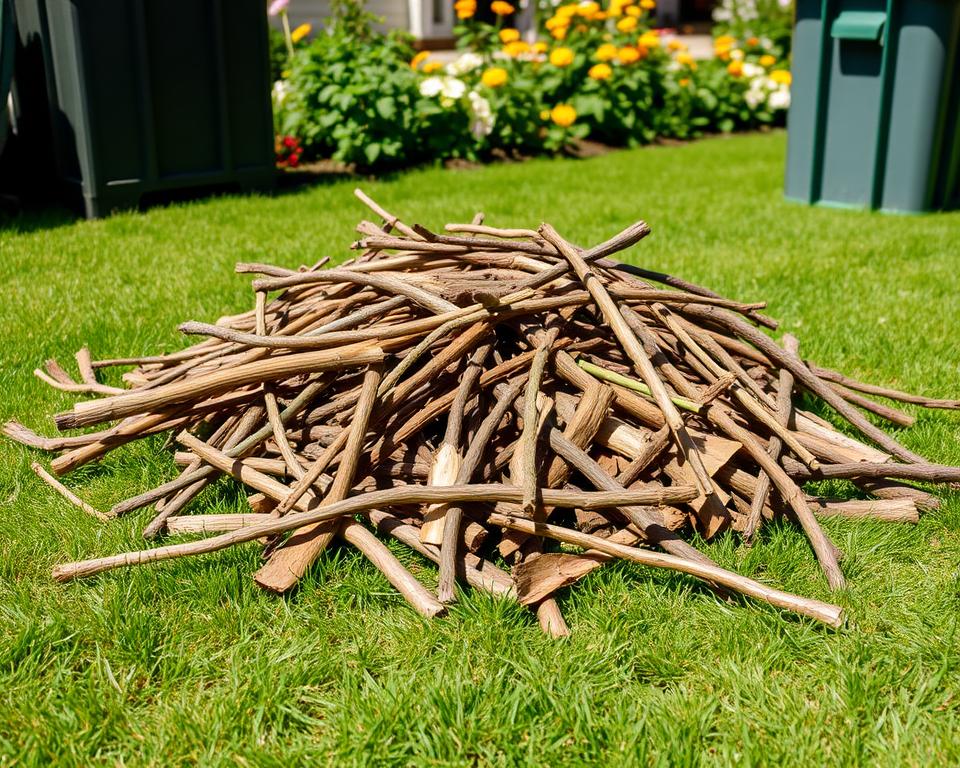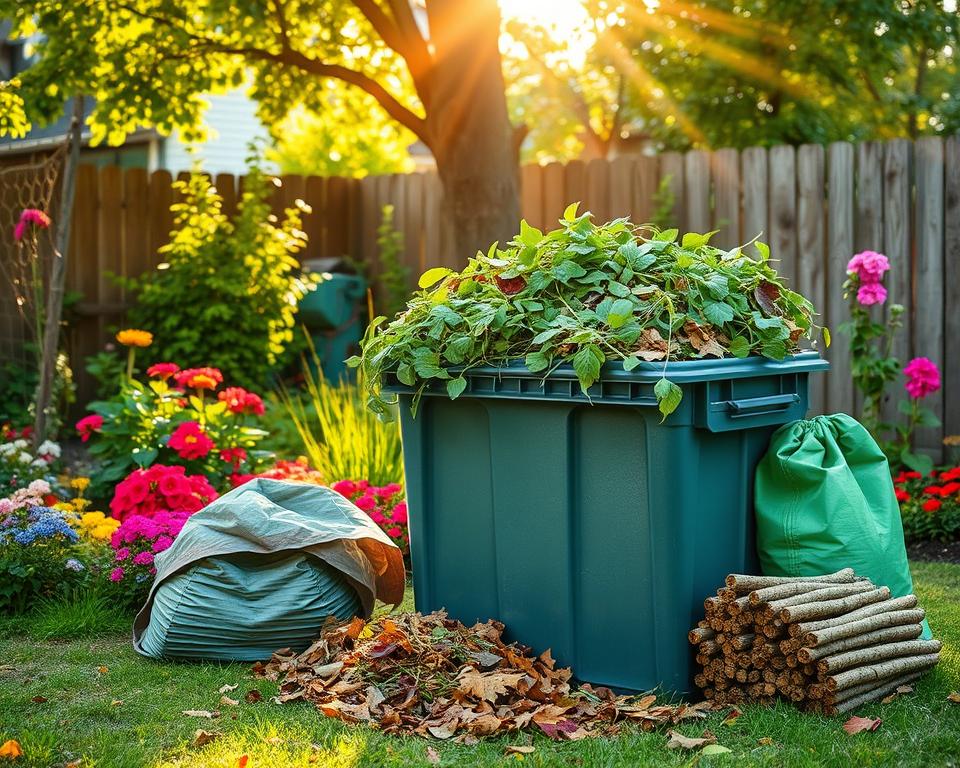As the warm summer breeze gently caresses the vibrant foliage of my backyard, I can’t help but feel a sense of pride and accomplishment. But with the changing seasons come the inevitable task of yard cleanup – a chore that, while necessary, can often feel daunting and overwhelming. How do I dispose of all this garden waste effectively and efficiently?
The answer lies in understanding the impact of proper dispose garden waste and exploring the various solutions available. From composting to curbside pickup, recycling to eco-friendly disposal practices, this article will guide you through the essential steps to transform your yard waste into a sustainable, Earth-friendly resource.
Key Takeaways
- Proper yard trimmings disposal is crucial for maintaining a healthy, attractive yard and protecting the environment.
- Organic waste such as leaves, grass clippings, and branches can be repurposed through composting, mulching, and recycling.
- Exploring alternative landscape clippings disposal methods can save time, money, and reduce your environmental impact.
- Green waste recycling and sustainable disposal practices promote environmental stewardship and create valuable resources from biodegradable materials.
- Understanding local regulations and community efforts can help you navigate the dispose garden waste process effectively.
Understanding Garden Waste and Its Impact
Garden waste encompasses a diverse array of organic materials, including leaves, grass clippings, pruning and yard debris, soil, and unwanted plants. Proper disposal of this garden waste plays a crucial role in maintaining ecological health and promoting sustainable practices.
Types of Garden Waste
Garden waste consists of various components, such as green waste (e.g., grass clippings, leaves, weeds), brown waste (e.g., branches, twigs, wood chips), and organic materials like turf and undesired plants. Careful management of these waste types is essential for a healthy, thriving outdoor environment.
Benefits of Proper Disposal
- Recycling garden waste, such as grass clippings and fallen leaves, can create nutrient-rich organic mulch to enrich the soil and promote plant growth.
- Composting yard waste helps divert organic materials from landfills, reducing the production of methane, a potent greenhouse gas.
- Proper disposal of garden waste can prevent pest infestations, maintain a clean and attractive yard, and mitigate safety hazards.
- Leaving grass clippings on the lawn after mowing provides essential nutrients and moisture for healthy grass growth, reducing the need for fertilizers.
By understanding the various types of garden waste and the benefits of responsible disposal, homeowners and communities can work together to create a more sustainable and environmentally conscious approach to yard maintenance.
Composting: A Sustainable Solution
Composting at home offers a sustainable solution for managing garden waste. By transforming organic materials like leaves, grass clippings, and food scraps into nutrient-rich soil amendments, composting helps reduce the amount of waste that ends up in landfills. The key to successful composting is maintaining a balance between green (nitrogen-rich) and brown (carbon-rich) materials.
Composting at Home
Creating a compost pile or using a compost bin is a simple and effective way to recycle organic waste. Composting not only diverts waste from landfills but also produces valuable compost that can be used to enrich the soil in your garden. Grasscycling, the practice of leaving grass clippings on the lawn, is another method that enriches the soil without the need for a compost pile.
Composting has numerous benefits. It can reduce the volume of waste landfilled and cut pestilential odors associated with anaerobic degradation. Moreover, it helps in reducing methane emissions and can transform organic wastes into valuable nutrient-enriched soil amendments. Research shows a growing interest in composting municipal solid waste, with 39 research papers published in 2022 alone.
Compost is rich in essential plant nutrients like nitrogen, phosphorus, potassium, calcium, magnesium, and sulfur, which are crucial for plant growth, disease resistance, and microbial activity. However, composting can also have potentially toxic substances (PTS) present in the organic fraction of municipal solid waste, such as heavy metals, micro- and nano-plastics, persistent organic pollutants, pharmaceuticals, and personal care products. Proper collection strategies are necessary to mitigate these occurrences.
Composting at home is a technically manageable approach for composting organic waste locally, while centralized composting facilities may be employed in cases where proper separation of organic waste at the source can be ensured. By adopting composting practices, homeowners can reduce their reliance on synthetic fertilizers, promote healthier plant growth, and contribute to a more sustainable and eco-friendly lawn care routine.
Curbside Pickup Options for Garden Waste
Many municipalities offer convenient curbside yard waste pickup services to help residents dispose of their garden waste efficiently. These services typically require yard waste to be placed in biodegradable bags or specific bins for collection on designated days.
For larger projects, such as extensive landscaping or clean-up efforts, a yard waste dumpster rental can be a practical solution. These dumpsters provide ample space to handle significant amounts of debris, making the disposal process more streamlined and hassle-free.
Some key considerations when utilizing curbside yard waste pickup or a dumpster rental include:
- Adhering to local guidelines for preparing yard waste, such as using the correct size and type of bags or containers
- Ensuring yard waste is free from non-organic materials like dirt, rocks, or pet waste
- Arranging for prompt dumpster rental and removal to maintain a tidy property
- Exploring municipal waste services that may offer curbside pickup or other yard waste disposal options
By taking advantage of these convenient curbside and dumpster rental solutions, homeowners and businesses can efficiently manage their garden waste while contributing to a cleaner, more sustainable community.
| Service | Description | Key Benefits |
|---|---|---|
| Curbside Yard Waste Pickup | Municipal waste services that collect yard waste, such as leaves, grass clippings, and small branches, on designated pickup days |
|
| Yard Waste Dumpster Rental | Temporary dumpster service for larger volumes of garden waste, such as from landscaping projects or property clean-ups |
|
Recycle and Reuse: Turning Waste into Resources
As we strive to reduce the environmental impact of our gardening activities, recycling and reusing yard waste offer promising solutions. Mulching is a practical approach that involves reusing leaves and small twigs to enrich and protect garden soil. This sustainable practice not only enhances soil fertility but also helps retain moisture, reducing the need for frequent watering.
Mulching
Mulching is a simple yet effective way to repurpose your garden waste. By spreading a layer of leaves, grass clippings, or small twigs around your plants, you can create a protective barrier that suppresses weed growth, retains soil moisture, and gradually releases nutrients as the organic matter decomposes. This process helps your garden thrive while diverting waste from landfills.
Recycling Yard Waste
Beyond mulching, many communities offer dedicated green waste facilities where you can drop off your yard waste for responsible processing. These facilities often convert the organic matter into valuable compost or even biofuel, contributing to a more sustainable waste management system. By utilizing these local resources, you can ensure that your garden waste is transformed into a beneficial resource rather than ending up in a landfill.
When disposing of garden waste, it’s essential to seek out reputable services that adhere to environmental guidelines. This helps to guarantee that the organic matter is handled in a way that minimizes its environmental impact and maximizes its potential as a valuable resource.
| Waste Type | Decomposition Time |
|---|---|
| Paper towel | 2–4 weeks |
| Plastic bag | 10–20 years |
| Newspaper | 6 weeks |
| Apple core | 2 months |
| Aluminum can | 80–200 years |
| Glass bottle | 1 million years |
By embracing the principles of recycling and reuse, we can turn our garden waste into valuable resources, contributing to a more sustainable waste management system and reducing the environmental impact of our gardening practices.
Eco-Friendly Disposal Practices
When it comes to managing garden waste, eco-friendly disposal practices can make a significant difference. By adopting sustainable methods like grasscycling, mulching, and using waste as fertilizer, you can not only reduce your environmental impact but also benefit your garden in tangible ways.
Grasscycling and Mulching
Grasscycling, the practice of leaving grass clippings on the lawn after mowing, is a simple yet effective way to return valuable nutrients to the soil. This process can provide up to 25% of a lawn’s fertilizer needs, reducing the requirement for additional fertilizers. Similarly, mulching involves spreading a layer of material, such as shredded leaves or wood chips, over the soil. This helps preserve moisture, regulate temperature, and suppress weed growth, ultimately promoting healthier plant growth.
Using Waste as Fertilizer
Composting garden waste, including weeds, leaves, and plant trimmings, creates a nutrient-rich humus that can be used to naturally enrich the soil. This organic fertilizer helps to improve soil structure, retain moisture, and support the growth of beneficial microorganisms. Many communities offer yard waste collection programs or operate composting facilities to transform this valuable resource into a sustainable solution for gardeners.
| Eco-Friendly Disposal Practice | Benefits |
|---|---|
| Grasscycling | Provides up to 25% of a lawn’s fertilizer needs, reducing the requirement for additional fertilizers |
| Mulching | Helps preserve moisture, regulate temperature, and suppress weed growth, promoting healthier plant growth |
| Composting | Creates nutrient-rich humus that can be used as an organic fertilizer to improve soil structure and support beneficial microorganisms |
By embracing these eco-friendly disposal practices, gardeners can not only reduce waste but also contribute to the sustainable management of their landscapes. These methods not only benefit the environment but also enhance the overall health and vitality of the garden.
Dispose Garden Waste: Compliance and Community Efforts
Navigating the world of garden waste disposal can be a complex task, but understanding local regulations and tapping into community programs can make the process seamless. From mandates on organic waste separation to educational initiatives, there are various ways to ensure your yard cleanup efforts align with eco-friendly practices.
Local Regulations
Your local authorities play a crucial role in shaping the guidelines for garden waste management. Many regions have implemented bans on dumping yard waste in landfills, requiring residents to explore alternative disposal methods. For instance, in Delaware, a state-wide ban on yard waste in landfills has been in effect since 2007, encouraging sustainable solutions like mulching and composting.
Similarly, Indiana’s Code 13-20-9 prohibits the disposal of yard waste, including woody vegetation longer than 3 feet, in solid waste landfills by residential, commercial, and industrial sources. These regulations aim to divert organic matter from landfills, reducing methane emissions and preserving natural resources.
Community Waste Management Programs
Beyond local regulations, community initiatives can provide valuable support for garden waste disposal. Many municipalities offer seasonal yard waste collection services or bulk pickup options, making it convenient for residents to properly dispose of their organic waste. Additionally, some communities provide access to chipping or shredding services, allowing homeowners to transform their yard waste into useful mulch or compost.
Composting programs are also gaining traction in many neighborhoods, empowering residents to turn their garden waste into nutrient-rich soil amendments. These community-driven efforts not only reduce the burden on landfills but also promote a circular economy and sustainable practices within the local area.
By understanding and aligning with both local regulations and community-based waste management programs, you can play a crucial role in the responsible disposal of your garden waste, contributing to a greener, more sustainable future for your neighborhood.
Alternatives to Landfill Disposal
As we strive to reduce our environmental impact, exploring alternatives to landfill disposal for garden waste becomes increasingly crucial. Two viable options that offer sustainable solutions are wood chipping and junk removal services.
Wood Chipping and Shredding Services
Wood chipping is an efficient way to process large piles of branches, stumps, and other woody garden waste. These services transform solid waste into usable mulch or wood chips that can be repurposed for various landscaping and gardening applications. By diverting this material from landfills, we can promote a more circular economy and reduce the strain on our waste management systems.
Junk Removal Services
For garden waste that cannot be composted or chipped, junk removal services provide a convenient disposal solution. These services ensure that items like old lawn furniture, broken garden tools, and miscellaneous debris are responsibly handled, in alignment with local waste management guidelines. By utilizing junk removal, homeowners can avoid the hassle and environmental concerns associated with transporting these items to landfills.
While wood chipping, shredding, and junk removal services offer effective alternatives to landfill disposal, renting a yard waste dumpster can often be a more cost-effective and time-saving solution for managing large amounts of garden debris. By exploring these various options, homeowners can make informed choices that prioritize sustainable disposal practices and reduce the impact of their garden waste on the environment.
| Waste Management Option | Capacity | Suitability |
|---|---|---|
| Wood Chipping | Processes large piles of branches and stumps | Ideal for woody garden waste, produces usable mulch or wood chips |
| Junk Removal Services | Handles a variety of garden waste that cannot be composted or chipped | Convenient option for disposing of miscellaneous garden debris |
| Yard Waste Dumpster Rental | 10 Yard Dumpster: Up to 67 yard waste bags 20 Yard Dumpster: Approximately 134 yard waste bags |
Cost-effective and time-saving solution for managing large amounts of garden waste |
Safety and Environmental Concerns
Improper disposal of garden waste can pose significant safety risks and have detrimental environmental consequences. One of the most concerning practices is the burning of yard waste, which can create a host of air pollutants, including particulate matter, that can exacerbate respiratory issues and reduce visibility, leading to potential safety hazards. Additionally, the process of burning yard waste releases methane and carbon dioxide, contributing to greenhouse gas emissions and climate change.
Beyond air quality concerns, burning yard waste can also impact the surrounding temperature, presenting fire hazards and thermal risks to local wildlife. The ash and residue from the burning process can also contaminate the soil, adversely affecting soil quality and the overall health of the local ecosystem.
Hazards of Burning Yard Waste
- Releases air pollutants like particulate matter, exacerbating respiratory issues
- Reduces visibility, creating safety hazards
- Contributes to greenhouse gas emissions, worsening climate change
- Increases fire risks and thermal risks to local wildlife
- Contaminates soil, negatively impacting soil quality
Impact on Air and Soil Quality
In contrast, sustainable disposal methods like composting and recycling yard waste can help maintain clean air and soil quality. By turning organic matter into valuable resources, these practices avoid the negative environmental impact associated with burning yard waste. Composting, in particular, helps to create nutrient-rich soil amendments, reducing the need for chemical fertilizers and preserving natural resources.
| Disposal Method | Impact on Air Quality | Impact on Soil Quality |
|---|---|---|
| Burning Yard Waste | Releases air pollutants, contributes to greenhouse gas emissions | Contaminates soil, negatively impacts soil health |
| Composting and Recycling | Helps maintain clean air by avoiding burning | Creates nutrient-rich soil amendments, reduces need for chemical fertilizers |
Yard Waste Dumpster Rental: A Convenient Solution
Renting a yard waste dumpster is a convenient solution for efficiently disposing of garden debris. Dumpster rental services, such as those offered by Waste Removal USA, streamline the collection and composting of natural waste. This approach ensures that yard waste is disposed of in a manner that benefits the ecological system by turning it into nutrient-rich soil. Dumpster rental provides a hassle-free way to manage large amounts of garden waste while contributing to eco-friendly waste management practices.
Dumpster rental sizes offered range from 10 yards to 40 yards, catering to various landscaping project needs. The company provides dumpsters suitable for different waste types, such as tree branches, sod, dirt, and garden tools. However, specific items that cannot be disposed of in the dumpsters include chemicals, paints, and construction debris due to environmental concerns.
Junk King, a leading yard waste dumpster rental service, emphasizes offering cost-effective and eco-friendly solutions for yard waste disposal. Their MINI Dumpsters are designed to hold waste from a variety of yard cleanup projects, providing a convenient solution for disposing of yard waste and debris. Customers are encouraged to contact the company to discuss their waste types and ensure proper disposal methods.
- Junk King MINI Dumpsters are 12-yard roll-off dumpsters, offering more value compared to competitors’ 10-yard dumpsters.
- Junk King provides upfront pricing for their dumpster rental services, allowing customers to pay only for the space they use.
- The company guarantees on-time drop-off and pick-up for their dumpster rentals.
- Junk King’s dumpsters are designed with side doors for easy access, enabling easy loading of debris without heavy lifting.
By utilizing yard waste dumpster rental services, customers can conveniently dispose of their garden debris while contributing to eco-friendly waste management practices. This hassle-free solution streamlines the disposal process and ensures responsible handling of natural waste materials.
Conclusion
Proper disposal of garden waste is essential for maintaining a healthy and visually appealing outdoor space while also considering the environmental impact. By utilizing eco-friendly methods such as composting, mulching, and recycling, you can transform your yard trimmings into valuable resources that enrich the soil and promote sustainable garden waste disposal and eco-friendly landscaping practices.
Additionally, understanding local regulations and leveraging community sustainable waste management programs can further support your efforts to dispose of garden waste responsibly. By adopting a comprehensive approach to yard waste management, you contribute to a greener environment and a more beautiful, thriving outdoor space.
Remember, the journey towards a sustainable yard waste disposal solution is an ongoing one, but with the right knowledge and a commitment to eco-friendly practices, you can make a significant difference in your community and the environment as a whole.
FAQ
What types of materials are considered garden waste?
Garden waste encompasses a variety of organic materials, including leaves, grass clippings, pruning and yard debris, soil, and plants.
How does proper disposal of garden waste benefit the environment?
Proper disposal of garden waste contributes to ecological health by turning it into compost and nutrient-rich mulch, which can enrich the soil and promote healthier plant growth.
What are the benefits of composting at home?
Composting at home is a sustainable way to transform garden waste into nutrient-rich soil amendments. The key to successful composting is maintaining a balance between green (nitrogen-rich) and brown (carbon-rich) materials.
What are the options for curbside yard waste pickup services?
Many municipalities offer curbside yard waste pickup services, which typically require yard waste to be placed in biodegradable bags or specific bins for collection. For larger projects, a yard waste dumpster rental can be an efficient solution.
How can yard waste be recycled and reused?
Recycling yard waste extends beyond turning it into compost. Mulching is a practical approach that involves reusing leaves and small twigs to enrich and protect garden soil. Some areas also have dedicated green waste facilities where you can drop off yard waste for responsible processing.
What are the eco-friendly disposal practices for garden waste?
Eco-friendly disposal practices, such as grasscycling and mulching, as well as using garden waste as fertilizer, are beneficial for your garden and the environment.
How do local regulations and community programs impact garden waste disposal?
Understanding local regulations and leveraging community waste management programs are crucial when addressing garden waste disposal. Local regulations govern the parameters for yard waste collection, and community initiatives, such as collection sites and educational outreach programs, play a significant role in the recycling and eco-friendly disposal of garden waste.
What are the alternatives to landfill disposal for garden waste?
Instead of sending garden waste to landfills, explore alternative services like wood chipping and junk removal. While these services can be effective, renting a yard waste dumpster is often a more cost-effective and time-saving solution for managing garden debris.
What are the safety and environmental concerns with improper disposal of garden waste?
Improper disposal of garden waste, such as burning, can pose safety risks and harm the environment by creating air pollutants, contributing to climate change, and impacting the surrounding temperature.
How can a yard waste dumpster rental help with efficient garden waste disposal?
Renting a yard waste dumpster is a convenient solution for efficiently disposing of garden debris. Dumpster rental services streamline the collection and composting of natural waste, ensuring that yard waste is disposed of in a manner that benefits the ecological system.
Source Links
- https://www.budgetdumpster.com/resources/how-to-dispose-of-yard-waste.php
- https://www.junk-king.com/services/items-we-take/yard-waste
- https://www.familyhandyman.com/article/how-to-dispose-of-yard-waste/
- https://www.dripworks.com/blog/what-to-do-with-garden-waste?srsltid=AfmBOooLR1wHjEvjsB75b2bbQlIB3hU-DpW8tYTN8PlcF2EWXjfDZhgL
- https://todayshomeowner.com/lawn-garden/guides/the-complete-guide-to-yard-waste-disposal/
- https://www.mdpi.com/2071-1050/16/15/6329
- https://www.unep.org/ietc/news/story/composting-solution-food-loss-and-waste
